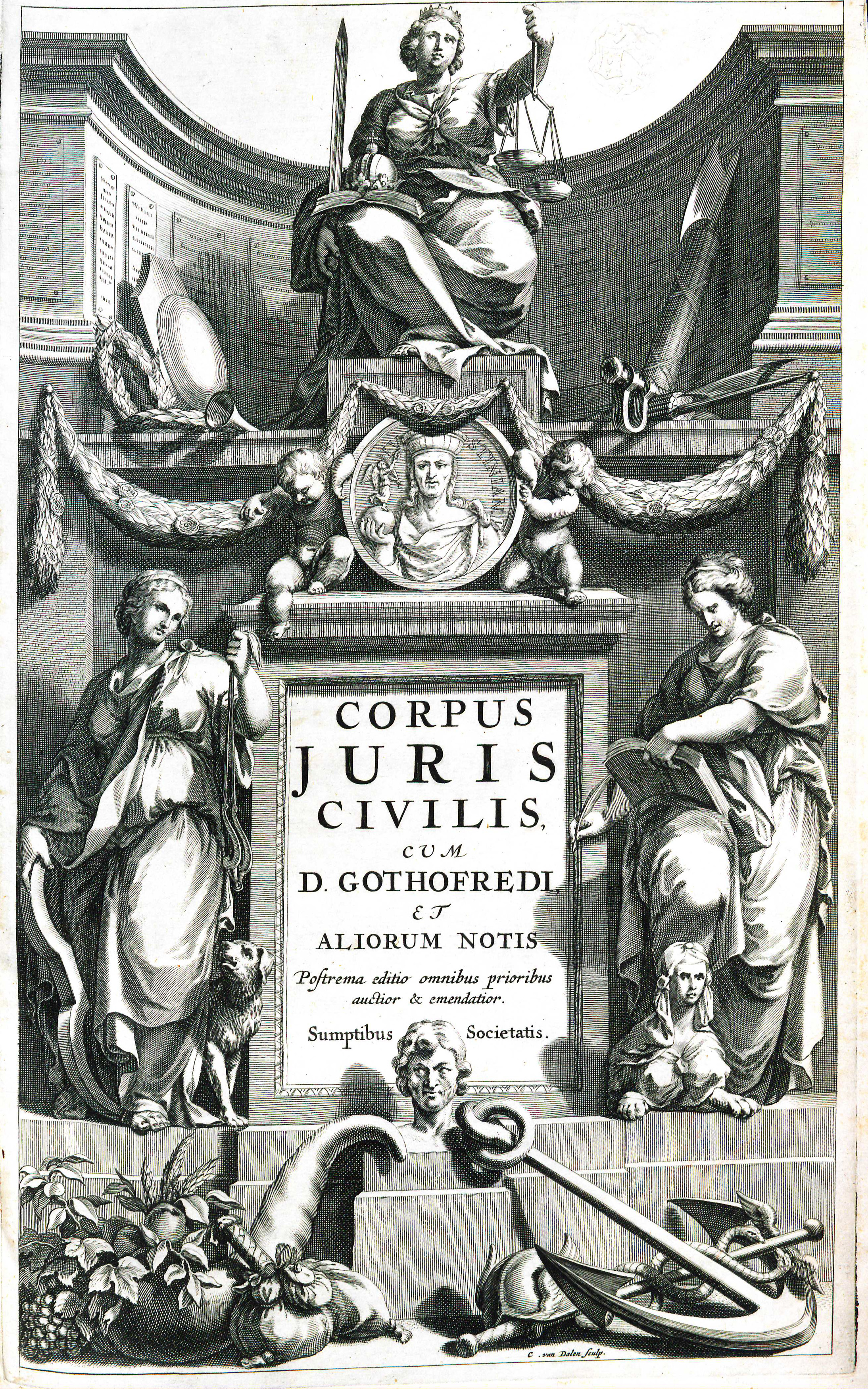Corpus Juris Civilis: Pandectis ad Florentinum Archetypum Expressis, Institutionibus, Codice et Novellis, Addito Textu Græco, ut & in Digestis & Codice, Legibus & Constitutionibus Græcis, cum Optimis Quibusque Editionibus Collatis
| Corpus Juris Civilis | |
|
Title page from Corpus Juris Civilis, George Wythe Collection, Wolf Law Library, College of William & Mary. | |
| Editor | Denis Godefroy |
| Published | Amstelodami: apud Joannem Blaeu, Ludovicum, & Danielem Elzevirios ; Lugd. Batavorum : apud Franciscum Hackium |
| Date | 1663 |
| Language | Latin |
| Volumes | 2 volume set |
| Desc. | Folio (40 cm.) |
| Location | Shelf M-5 |
Corpus Juris Civilis is divided into four parts: the Digest, the Codex, the Institutes, and the Novels.[3] The Digest, the largest of the works, preserved the writings of classical jurists.[4] The Codex compiled all of the existing imperial constitutiones (imperial pronouncements having the force of law), back to the time of Hadrian. It used both the Codex Theodosianus and the fourth-century collections embodied in the Codex Gregorianus and Codex Hermogenianus.[5] The Institutes provided an introduction to the law for students, and the Novels were the new pronouncements of Justinian that followed the completion of the other parts of the Corpus.[5]
Evidence for Inclusion in Wythe's Library
Listed in the Jefferson Inventory of Wythe's Library as '... juris civilis. fol.' and given by Thomas Jefferson to James Dinsmore. While the precise title and work are unknown, it is highly likely that Jefferson's notation refers to a copy of Corpus Juris Civilis. Brown's Bibliography[6] includes the 1726, 2 volume, folio edition based in part on the copy Jefferson sold to the Library of Congress.[7] George Wythe's Library[8] on LibraryThing notes "Precise work/edition unknown. Possibly an edition of Denis Godefroy's Corpus juris civilis." The Wolf Law Library moved a copy of the 1663 Amsterdam edition from the general rare books collection to the George Wythe Collection.
Description of the Wolf Law Library's copy
Rebound in quarter-calf with speckled boards. Spine features five raised bands with blind-tooled stamps and red labels. Title page of volume one and half-title of volume two inscribed "Grosley." Half-title in volume one includes an embossed stamp. Purchased from The Lawbook Exchange, Ltd.
Images of the library's copy of this book are available on Flickr. View the record for this book in William & Mary's online catalog.
Full text
See also
References
- ↑ Peter Birks and Grant McLeod, "Introduction" in Justinian's Institutes (Ithaca, New York: Cornell University Press, 1987), 8.
- ↑ The Columbia Encyclopedia, s.v. "Corpus Juris Civilis," accessed October 10, 2013.
- ↑ The Macquarie Dictionary, s.v. "Corpus Juris Civilis," accessed October 10, 2013.
- ↑ Birks and McLeod, "Introduction," 10.
- ↑ Ibid, 9.
- ↑ Bennie Brown, "The Library of George Wythe of Williamsburg and Richmond," (unpublished manuscript, May, 2012) Microsoft Word file. Earlier edition available at: https://digitalarchive.wm.edu/handle/10288/13433
- ↑ E. Millicent Sowerby, Catalogue of the Library of Thomas Jefferson, (Washington, D.C.: The Library of Congress, 1952-1959), 2:399-400 [no.2196].
- ↑ LibraryThing, s.v. "Member: George Wythe," accessed on June 28, 2013.
External links
- Read Volume 1 of this book in Google Books.
- Read Volume 2 of this book in Google Books.



